10 best anime movies ever, ranked
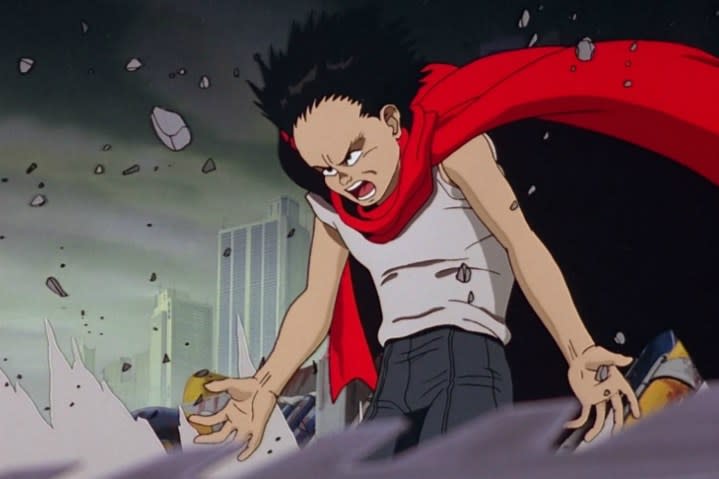
When it comes to representing Japanese media on a global scale, nothing surpasses the influence of anime. Great anime movies, in particular, have proven to be influential and important cinematic works that have impressed fans and critics alike with their unique visual aesthetics and rich storytelling. The best anime films are a testament to the boundless artistry and creativity in Japanese animation.
With anime titans like Studio Ghibli and director Satoshi Kon dominating the genre, this specific ranking will only feature a limited number of their films to better showcase a more diverse selection of anime masterpieces. From the groundbreaking Akira to the legendary Spirited Away, these anime movies span a range of genres and styles, with all of them representing the vibrant world of Japanese animation.
10. Cowboy Bebop: The Movie (2001)
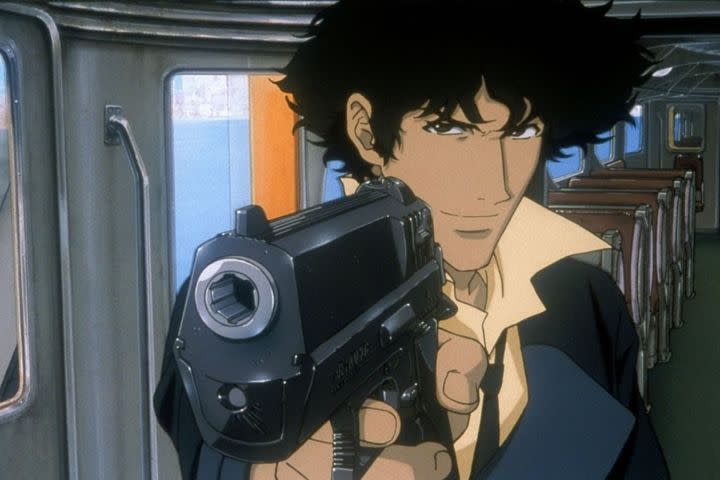
The 1998 neo-noir space Western series Cowboy Bebop is a seminal work in anime, and the 2001 film directed by Shinichirō Watanabe gives fans more time and misadventures in the same universe. Its story follows the crew of the spaceship Bebop — bounty hunter Spike Spiegel (Koichi Yamadera), former cop Jet Black (Unshō Ishizuka), femme fatale Faye Valentine (Megumi Hayashibara), hacker prodigy Ed (Aoi Tada), and their Welsh corgi, Ein — as they chase down criminals across the galaxy.
Cowboy Bebop: The Movie takes the sleek visual flair of the series and turns it up a notch, with its aesthetics making it a true standout in the genre. The priority is form over substance in the film, which shows an anime movie’s style can easily compensate for the lack of a complex plot. While it’s that aspect that has also earned it minor negative criticism, the 2001 movie is celebrated overall as an entertaining but not quite equal continuation of the show.
9. The Girl Who Leapt Through Time (2006)
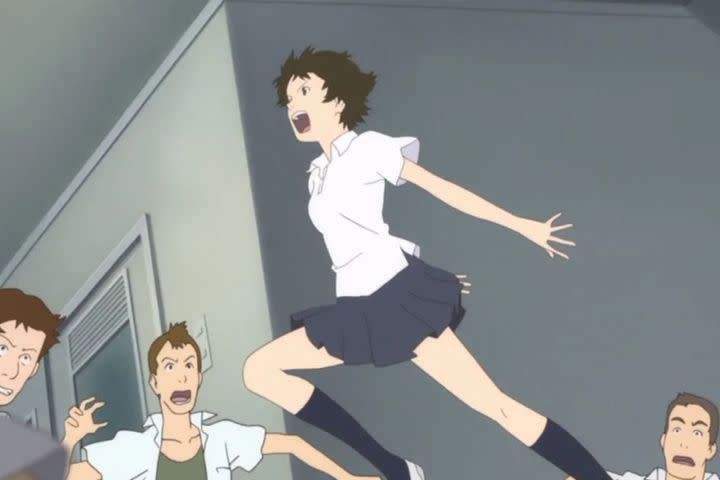
The Girl Who Leapt Through Time is a charming and surprisingly emotional anime movie that’s centered on the high school student Makoto Konno (Riisa Naka), whose ordinary life becomes extraordinary when she discovers she can leap through time. Directed by Mamoru Hosoda, the film depicts Makoto’s experiences as she uses her newfound power to avoid embarrassing situations, improve her grades, and spend more time with her friends. However, she soon learns that these small changes have unintended consequences.
Like many of the best time travel movies ever made, the 2006 film explores the unforeseen effects that the ability can have not just on the user but also on those around them. The added romantic element and unexpected plot twist risk making the film convoluted, but for the most part, The Girl Who Leapt Through Time manages to pull it off and endures as a fantastic example of the subgenre.
8. Tokyo Godfathers (2003)
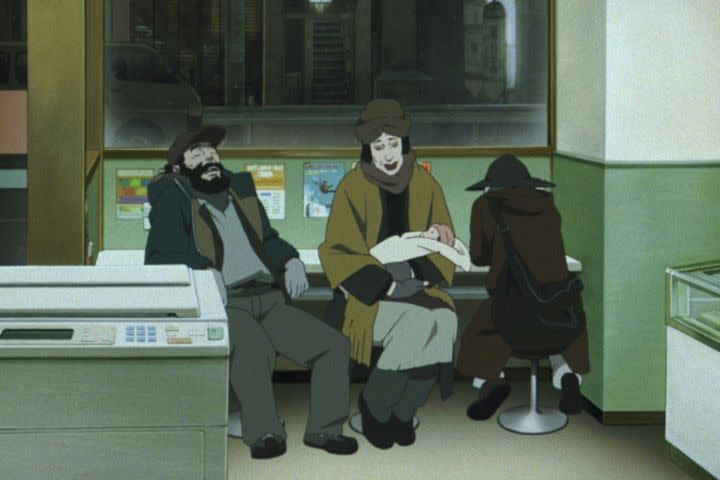
Director Satoshi Kon is a master of the genre, and Tokyo Godfathers is among his finest movies. Serving as a sort of unconventional holiday movie, the 2003 film revolves around an unusual trio of homeless individuals made up of Gin (Toru Emori), who lives with alcoholism, Hana (Yoshiaki Umegaki), a former drag queen, and Miyuki (Aya Okamoto), a teenage runaway. The trajectories of their lives change after they discover an abandoned baby on Christmas Eve in Tokyo.
Tokyo Godfathers is one of Kon’s more grounded films, with the bustling streets of Japan’s busiest city serving as the perfect backdrop for the main characters’ chaotic journey. As they search for the baby’s parents, the movie shifts its focus to each character’s background, flaws, and hopes of redemption. It’s a fresh perspective and style of storytelling that works so well, with the tragicomedy offering both a darkly humorous and poignant viewing experience.
7. Your Name (2016)
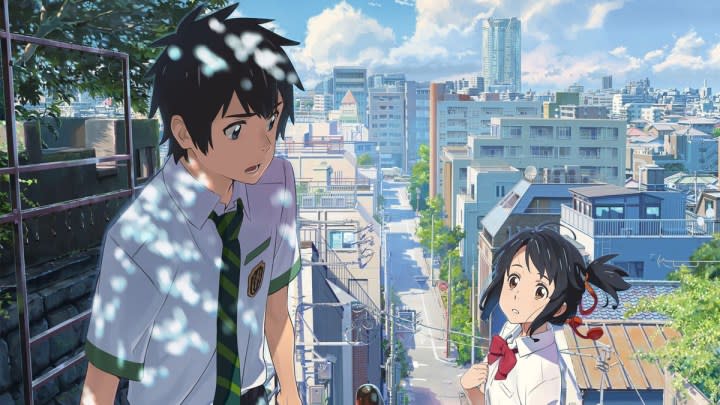
An anime film that has undoubtedly moved countless viewers to tears, Your Name is a must-see modern classic. The movie follows the intertwined destinies of two teenagers, Taki (Ryunosuke Kamiki) and Mitsuha (Mone Kamishiraishi), who start to mysteriously swap bodies despite not knowing each other. While this initially sparks chaos in their lives, they each begin to make small improvements for the other every time they swap, and eventually fall in love.
Your Name is one of the most visually stunning sci-fi anime out there, with director Makoto Shinkai’s trademark aesthetic elevating the romantic fantasy movie. It’s the incredible story that has made it so popular among fans, though, with Taki and Mitsuha’s love story easily among the most memorable in recent years. It’s impossible to say more about what makes Your Name an outstanding anime movie without spoiling its critical plot twist, but any fan of the genre should know that it’s considered essential viewing.
6. Princess Mononoke (1997)
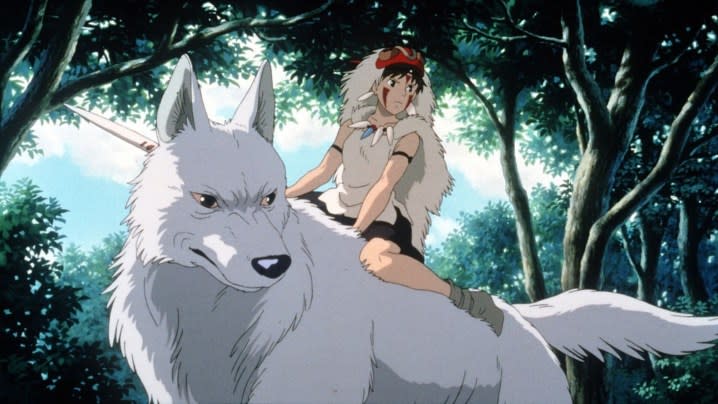
Director Hayao Miyazaki and Studio Ghibli have collaborated to create numerous crucial films in the genre, with Princess Mononoke being one of the most critically acclaimed. Set in the late Muromachi period of Japan, the sprawling epic portrays the tale of Ashitaka (Yoji Matsuda), a young warrior cursed by a boar demon’s wrath. To find a cure, he goes on a journey that leads him to Princess Mononoke (Yuriko Ishida), a fierce protector of the forest who is staunchly against the encroachment of humans.
Miyazaki has often explored environmentalism and man versus nature in his works, but no other Ghibli film captures this quite like Princess Mononoke. The clash between industrialization and nature is represented through the characters’ transformative arcs, themselves an allegory for real-world problems that persist more than ever before today. Paired with the 1997 movie’s timeless visuals, which are mostly still hand-drawn with just a touch of digital enhancement, and it’s easy to see why it enjoys the reputation it has today.
5. Neon Genesis Evangelion: The End of Evangelion (1997)
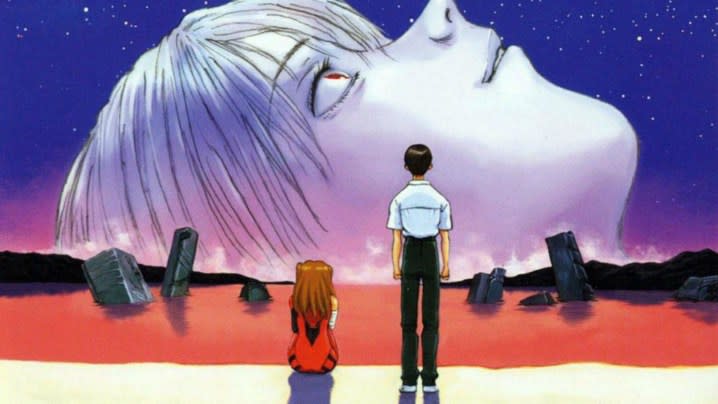
Neon Genesis Evangelion was one of the most significant series to come out of the ’90s, but its highly anticipated finale didn’t quite stick the landing. Enter The End of Evangelion, the equally important anime movie from 1997 that served as an alternative ending to the show’s convoluted final arc. Set in a post-apocalyptic world where humanity faces the threat of extinction from mysterious beings known as Angels, the film follows the protagonist Shinji Ikari (Megumi Ogata) as he struggles to find his place in this dark reality.
While the series’ abstract and somewhat abrupt ending provided viewers with some hope for a future, the film fully embraces its apocalyptic themes by depicting a bleak ending for humanity. Neon Genesis: The End of Evangelion is not exactly less abstract compared to the show’s convoluted finale, but the movie feels more fully realized in how it embraces its grim storyline.
4. Ghost in the Shell (1995)
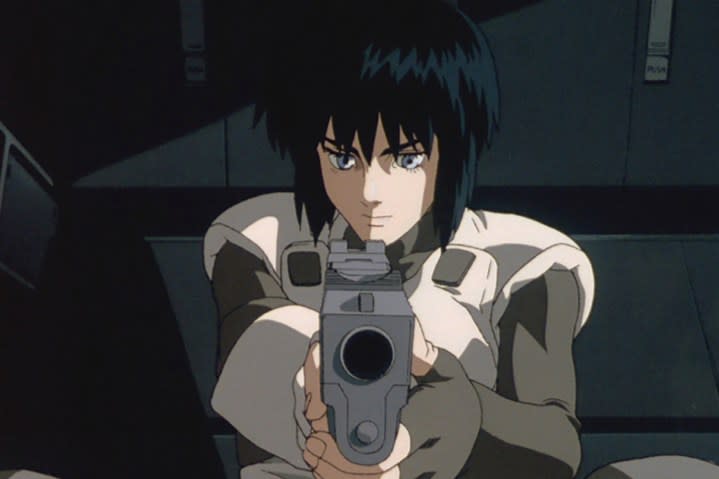
Director Mamoru Oshii’s Ghost in the Shell is a pioneering cyberpunk movie that tells the story of a cyborg federal agent Major Motoko Kusanagi (Atsuko Tanaka), who’s tasked with hunting down a mysterious hacker known as the Puppet Master. The criminal can change the identity of others, which soon makes Motoko think about what could be altered within her to make her more human.
Aside from cutting-edge visuals and framing, Ghost in the Shell is remembered for its innovative story, which showed the next step in blurring the line between man and machine. Motoko’s experiences suggest that anyone can have a soul, with her existential journey being the true highlight of the stirring film. While the movie was a box office failure when it premiered in 1995, it has since been critically reevaluated and is now considered among the best in the genre. It has inspired numerous filmmakers, including the Wachowskis and James Cameron, who called Ghost in the Shell “the first truly adult animation film to reach a level of literary and visual excellence.”
3. Perfect Blue (1997)
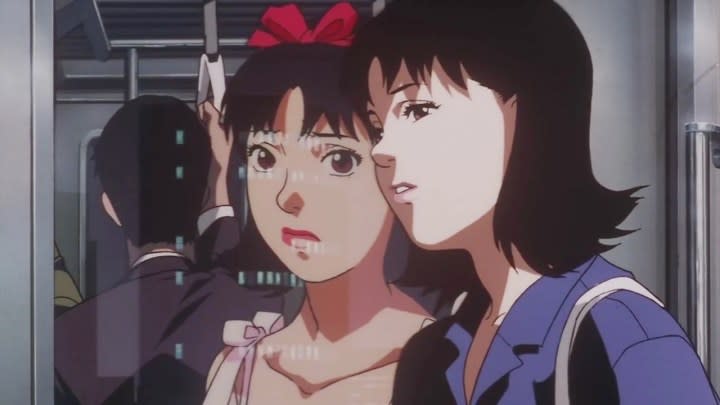
Perfect Blue is a monumental psychological thriller movie directed by Satoshi Kon. The film revolves around the pop idol Mima Kirigoe (Junko Iwao), who decides to leave her singing career to pursue acting. However, as she transitions into a full-blown celebrity, she becomes increasingly worried about a stalker and begins to experience disturbing hallucinations that blur the lines between reality and fantasy.
The 1997 film is Kon’s most beloved masterpiece, with its unflinching portrayal of the dark side of fame and obsession resulting in a haunting viewing experience that puts audiences right next to the increasingly frightened Mima. Perfect Blue would go on to famously influence directors like Darren Aronofsky, who takes shockingly direct inspiration from Kon’s work as seen in films like Requiem for a Dream and Black Swan. The unsettling original deserves more attention, as it’s a major work that showcased the medium’s capacity for mature and thought-provoking storytelling.
2. Akira (1988)
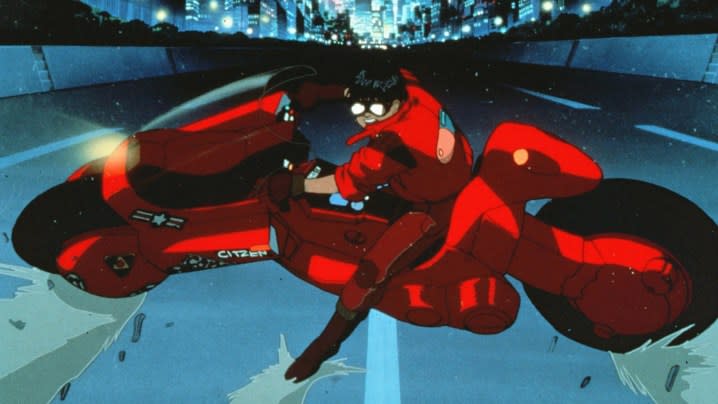
1988’s Akira is a pivotal cyberpunk movie that would influence and shape future entries both in anime and live action. Directed by Katsuhiro Otomo based on his own manga series, Akira takes place in a dystopian Neo-Tokyo in 2019, where young teens Kaneda (Mitsuo Iwata) and his friend Tetsuo (Nozomu Sasaki) become embroiled in a government conspiracy. Once part of the same biker gang, Kaneda must go against Tetsuo as he gains psychic powers and begins to wreak havoc across the city.
In many ways, Akira would propel the genre and Japanese filmmaking as a whole by introducing anime to the rest of the world. Its unprecedented depiction of the dilapidated city, biting social commentary, and technological advancements set a new standard for the industry not just in Japan but around the globe. Akira also underscored how mature storytelling and stunning animated visuals can go hand in hand to create iconic classics.
1. Spirited Away (2001)
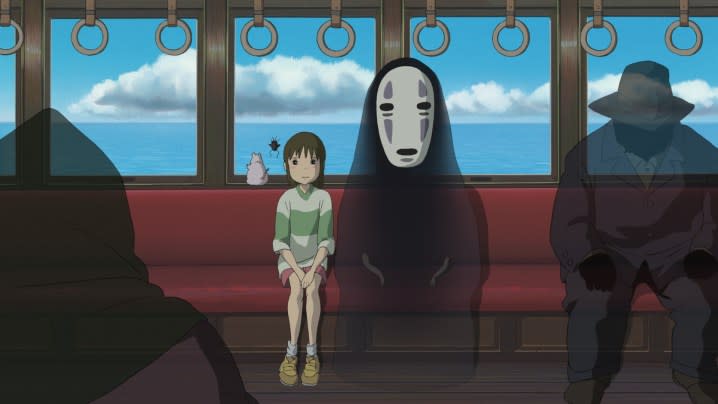
Never missing from any discussion of the best animated movies ever, Spirited Away is a film that needs no introduction. Director Hayao Miyazaki’s most popular movie is also his greatest work to date, with the magical fantasy anime film telling the now familiar story of a young girl named Chihiro (Rumi Hiiragi), who becomes trapped in a mysterious and supernatural realm. In order to save her parents, who have been transformed into pigs, and return home, 10-year-old Chihiro must navigate a surreal and often scary world filled with spirits, gods, and other fantastical creatures.
Spirited Away became an international sensation thanks to its breathtaking animation and incredible coming-of-age story. The dark fantasy film is whimsical, creepy, and inspiring all at once, with its vibrant universe serving as the perfect backdrop for its protagonist’s transformative journey. It’s chock-full of Miyazaki’s trademarks, which have helped ensure its enduring legacy and cultural impact as one of the most influential and celebrated anime films of all time.


